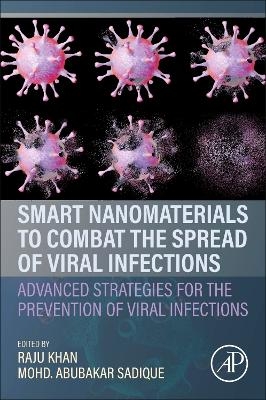
Smart Nanomaterials to Combat the Spread of Viral Infections
Academic Press Inc (Verlag)
978-0-323-99148-3 (ISBN)
This book provides a comprehensive overview of smart nanomaterials and advanced nano-system applications to researchers and academics in virology, microbiology, chemistry, material science, nanotechnology, and biotechnology as well as those in industries interested in their virucidal properties to prevent viral infections.
Raju Khan is a Senior Principal Scientist and Professor, at CSIR-Advanced Materials and Processes Research Institute, Bhopal. He did his PhD in Chemistry in 2005 from Jamia Millia Islamia, Central University, New Delhi, and Postdoctoral researcher at the “Sensor Research Laboratory University of the Western Cape, Cape Town. His current research involved synthesizing novel materials to fabricate electrochemical and fluorescence-based biosensors integrated with microfluidics to detect target disease risk biomarkers for health care monitoring. He has published over 150 papers in SCI journal, which attracted over 5500 citations as per Google Scholar, published 45 book chapters in the reputed book Elsevier and Taylor Francis, editing of 28 books from Elsevier and Taylor Francis, and his research has been highlighted in Nature India. He has supervised 5 PhD and 30 undergraduate/postgraduate theses and has supervised 4 numbers of postdoctoral fellows under the scheme of N-PDF, CSIR-Nehru Fellowship, and DST-Women Scientist Projects. Mohd. Abubakar Sadique is a Ph.D. research scholar under the supervision of Dr. Raju Khan at CSIR-AMPRI, Bhopal. India. He has worked as a Senior Project Fellow at CSIR-CEERI, Pilani, Rajasthan, India, on a mission-mode project titled "Design and Fabrication of a Microfluidic-Based Bio-Sensor for Biochemical Detection." His recent research includes the use of nanotechnology for healthcare applications. Mr. Sadique’s research interests include green synthesis, electrochemical studies of nanomaterials, their characterization, and their healthcare applications. Mr. Sadique has a particular interest in carbon-based nanostructures for their effectiveness in the purview of bio-sensing, diagnostics, therapeutics, and healthcare applications. He has been associated with various research and development projects funded by different agencies, which include the Department of Science and Technology and the Council of Scientific and Industrial Research (CSIR), India. Mr. Sadique has published several review and research articles, three books edited, and numerous book chapters during his brief research tenure.
1. Infectious diseases: overview, challenges, and perspectives 2. Viral structure and stability in various biotic and abiotic environments 3. General preventive measures to control the transmission and COVID-19 pandemic management: a public outreach 4. Virucidal activity of nanomaterials for the viruses: a SARS-CoV-2 case study 5. Role of metal nanoparticles for treatment of and prevention of viral infections 6. Nanotechnology advancements in antiviral coatings to combat viral infection surfaces 7. Surface-modified biomaterials as disinfectants to combat viral infections: a SARS-COV-2 case study 8. Functional nanoparticles as novel emerging antiviral therapeutic agents 9. Potential of graphene-modified nanostructures for multifunctional personal protective clothing 10. Role of nanocomposites for the prevention and treatment of viral infections in the health care system 11. Role of copper nanostructures in household and clinical settings: past to present outlook 12. Recent advances in antiviral coatings on facemasks during the COVID-19 pandemic 13. Nanotechnology and materials science help fight against SARS-CoV-2 14. Inorganic?organic hybrid capsules for efficient intracellular delivery of antiviral agents to disinfect and treat virus infections 15. Utilization of AI and IoT-based smart nanosystems for the control and management of COVID-19 pandemic 16. Potential socioeconomic approaches for commercialized antimicrobial applications
| Erscheinungsdatum | 02.03.2023 |
|---|---|
| Verlagsort | Oxford |
| Sprache | englisch |
| Maße | 152 x 229 mm |
| Gewicht | 720 g |
| Themenwelt | Naturwissenschaften ► Biologie ► Mikrobiologie / Immunologie |
| Technik ► Umwelttechnik / Biotechnologie | |
| ISBN-10 | 0-323-99148-3 / 0323991483 |
| ISBN-13 | 978-0-323-99148-3 / 9780323991483 |
| Zustand | Neuware |
| Haben Sie eine Frage zum Produkt? |
aus dem Bereich


